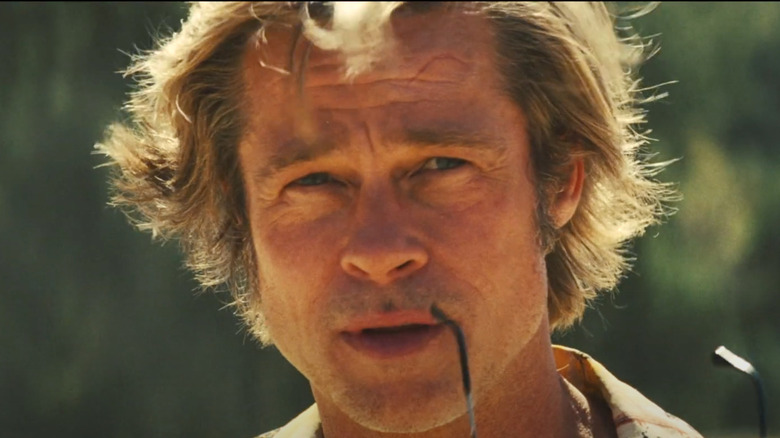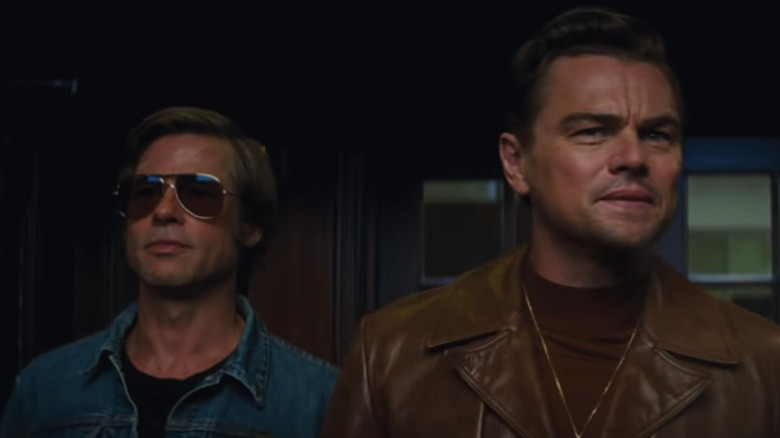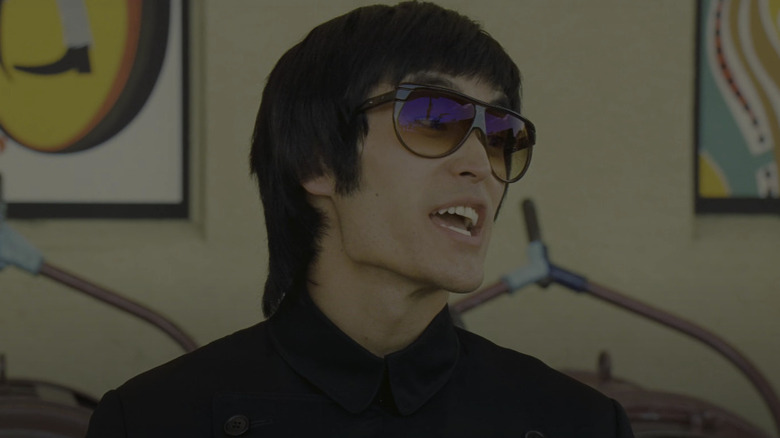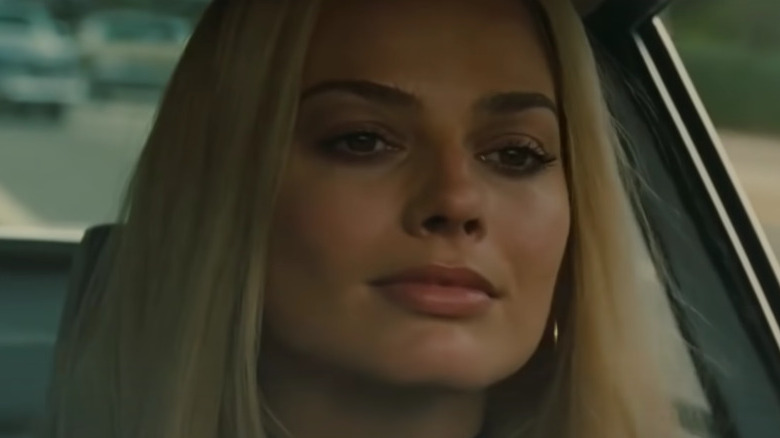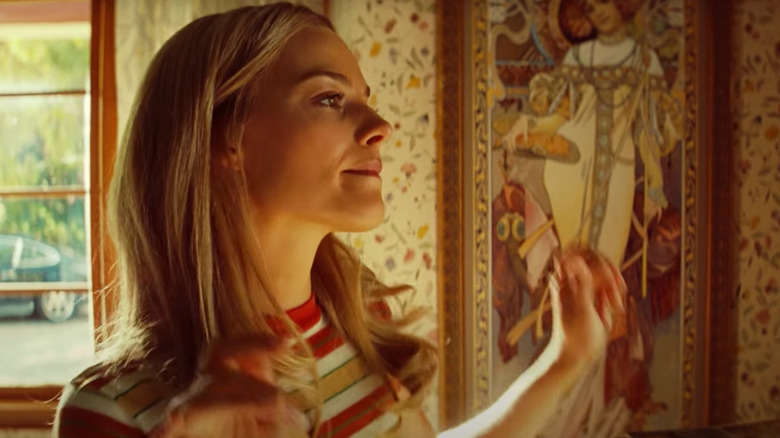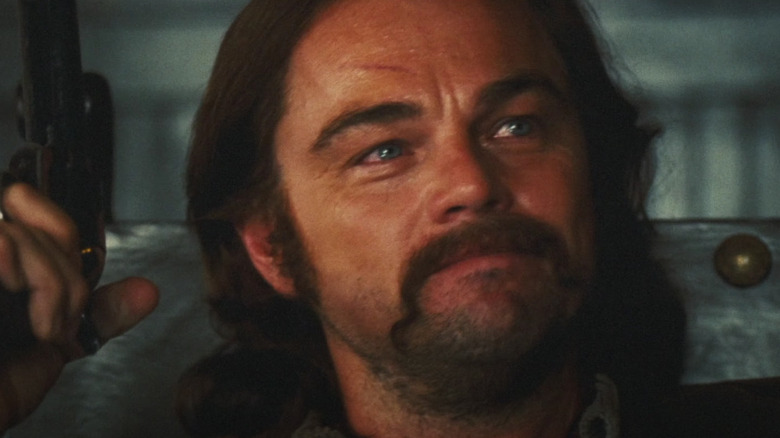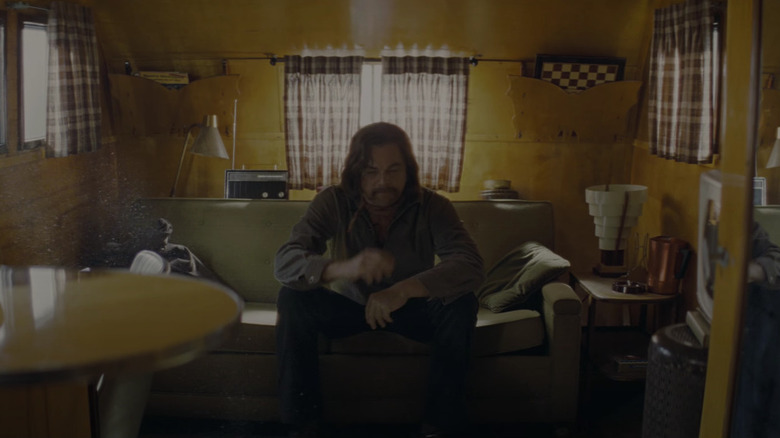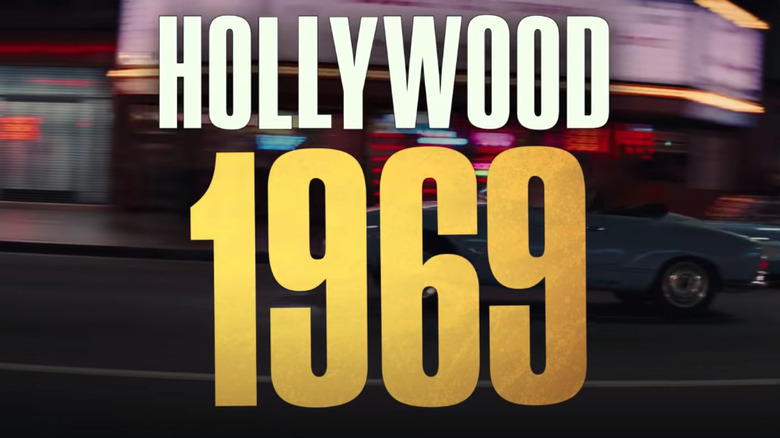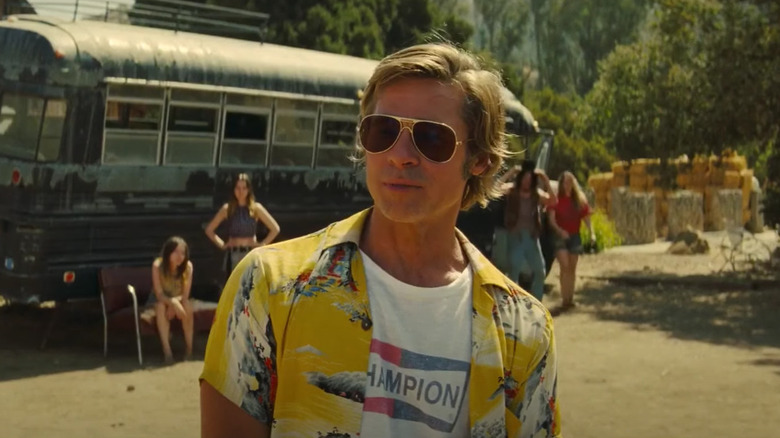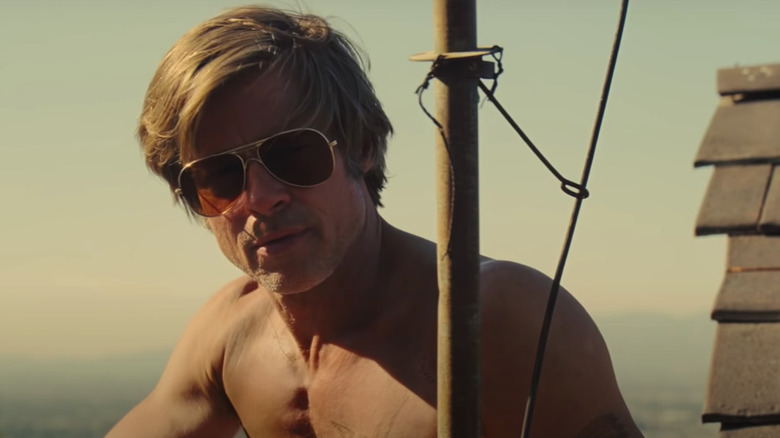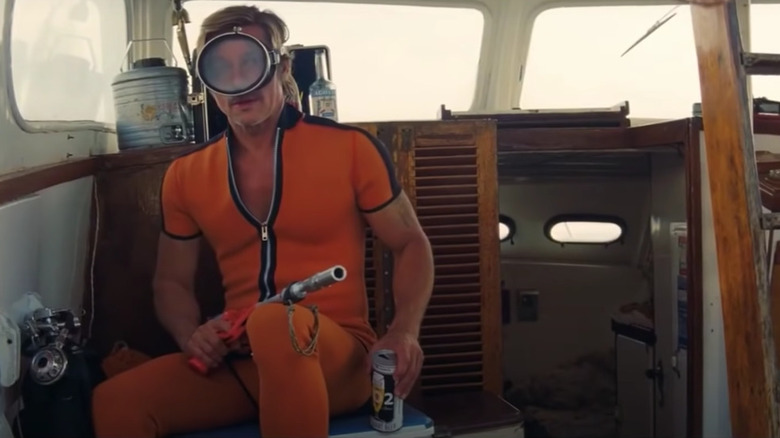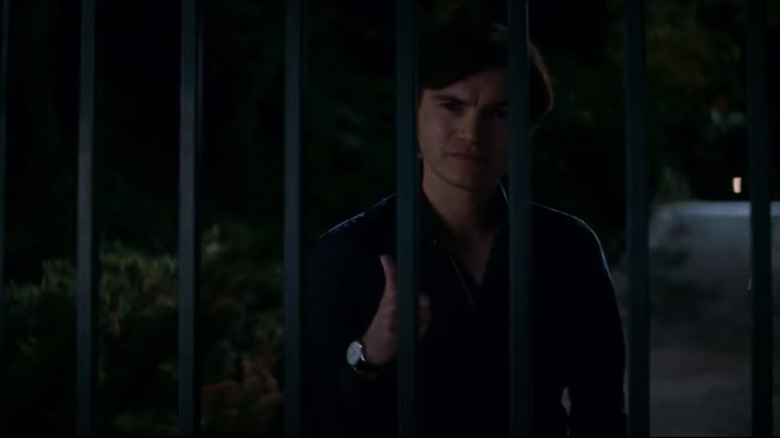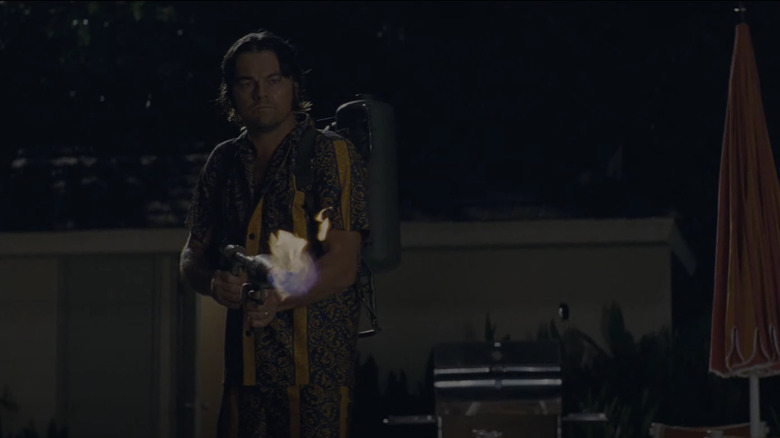The 6 Best And 6 Worst Things About Once Upon A Time In Hollywood
Quentin Tarantino's Academy Award-winning "Once Upon a Time in Hollywood" remains an immensely entertaining look at Hollywood in the late '60s, when westerns were all the rage and theaters were adorned with the likes of Clint Eastwood and Steve McQueen.
Starring Leonardo DiCaprio, Brad Pitt, and Margot Robbie, the film chronicles former movie star Rick Dalton (DiCaprio) and his exploits with famed stuntman Cliff Booth (Pitt) in the midst of his rapidly declining career. Their story is framed around the actress Sharon Tate (Robbie), who was viciously murdered by members of Charles Manson's (Damon Herriman) cult. As he did in "Inglourious Basterds," Tarantino presents an alternate perspective on real-life events and even charts a new course for history to follow.
"Once Upon a Time in Hollywood" features an abundance of iconic scenes that come packaged in Tarantino's trademark dialogue and carefully crafted direction. That said, the film is far from perfect — there are plenty of negative elements that deserve critical examination. Here are the six best and six worst aspects of "Once Upon a Time in Hollywood."
BEST: Rick Dalton and Cliff Booth's Relationship
"Once Upon a Time in Hollywood" serves as a love letter to Tinseltown and all things movie-related, but the film also delivers one of the more likable bromances of the past few years. As Rick Dalton and Cliff Booth, DiCaprio and Pitt are a match made in cinema heaven — a pair of guys who genuinely care for and support each other through thick and thin, to the point where Cliff's life seems to revolve around his actor pal's well-being. He drives Rick to film shoots, fixes his roof, shows up to watch his TV performances, and offers emotional support without asking for much in return.
Rick is more self-centered — he is an actor, after all — and mostly views Cliff as his own personal safety net. "Cliff here is meant to help carry the load," he explains to a reporter during an interview. Indeed, much of that load involves helping Rick work through his insecurities, or doing the little things to keep his life running smoothly.
Thankfully, by the story's end, Rick appears to appreciate his loyal stunt double more than ever following the violent confrontation with the Manson cult. As Cliff is being placed in an ambulance after sustaining an injury during the incident, Rick takes a moment to tell his pal: "You're a good friend, Cliff."
Indeed, Rick. Indeed.
WORST: Portrayal of Bruce Lee
Tarantino incurred quite a bit of criticism for his portrayal of Bruce Lee in a brief flashback sequence. The iconic martial artist, who appeared in television shows such as "The Green Hornet" and motion pictures like "Fist of Fury" and "Enter the Dragon," is seen as a cocky loudmouth with little respect for the others around him. His haughty demeanor draws the ire of Cliff Booth, who challenges the actor to a fight. The pair toss each other about and eventually end in a draw.
Lee's daughter, Shannon, felt the depiction of her father was disrespectful and blasted Tarantino in The Hollywood Reporter, saying "I'm really f***ing tired of white men in Hollywood trying to tell me who Bruce Lee was ... I'm tired of hearing from white men in Hollywood that he was arrogant and an a**hole when they have no idea and cannot fathom what it might have taken to get work in 1960s and '70s Hollywood as a Chinese man with (God forbid) an accent ..."
Tarantino defended the portrayal in an interview with Joe Rogan, stating that "the stuntmen hated Lee on the set of 'The Green Hornet,'" using Matthew Polly's book, "Bruce Lee: A Life," as a reference. At any rate, Tarantino's film does Bruce Lee no favors, and his efforts to turn the actor into a punchline leave much to be desired.
BEST: Margot Robbie as Sharon Tate
Margot Robbie steals practically every film she appears in with her stunning beauty and strong acting chops. That trend continues in "Once Upon a Time in Hollywood," where the young starlet portrays real-life actress Sharon Tate as she ventures through LA with wide-eyed whimsy. In her brief screen time, Robbie radiates innocence and a certain naïveté even as she parades through star-studded parties, bumps shoulders with the likes of Steve McQueen, and dances to tunes while doing odd jobs around her home.
There's a terrific scene in which Tate giddily watches herself on the big screen in "The Wrecking Crew" — Robbie, hiding behind a pair of enormous glasses, plays the moment with bashful exuberance. When her on-screen antics draw applause from the audience, it's all she can do to keep herself from jumping out of her seat in jubilation. Robbie's performance serves as a reminder of the glitz and glamor a successful life in Hollywood can conjure, even if it's only for a brief moment.
WORST: Too Little of Margot Robbie as Sharon Tate
We love Margot Robbie as Sharon Tate in "Once Upon a Time in Hollywood" — the actress warms the screen with her presence and allows us to see Tate as a real person striving for success.
Unfortunately, there's simply too little of her character in the sprawling, almost three-hour runtime. That's not necessarily a knock on Tarantino, as he was clearly telling the story of Rick Dalton and Cliff Booth — two characters whose lives happen to intersect with Tate. If anything, it's a testament to how much we enjoyed Robbie's performance.
Indeed, Tarantino shot down the suggestion that he needed to give Robbie more lines during a press conference at Cannes Film Festival. When asked about the matter, the director stated simply, "I reject your hypothesis." Even so, it would have been nice to see Tate get a little more to do, considering her overall importance to the story. We'll take what we can get ... albeit begrudgingly.
BEST: Rick Dalton's Big Moment
Leonardo DiCaprio is terrific as Rick Dalton, a movie star-turned-TV-actor who believes his days in show business are numbered. He's wound incredibly tight and clearly off his game. We witness the actor's fall from grace, as it were, during a shoot in which he forgets his lines and forces the production to reset multiple times. Naturally, the actor heads to his trailer and breaks down emotionally. He drinks, smokes, swears, tosses objects, breaks mirrors, and struggles to keep it together.
Thankfully, after a little more self-reflection, and a pep talk from a pint-sized actress, Rick reminds the world why he's a superstar by delivering an amazing performance in a climactic scene. "That was the best acting I've ever seen in my whole life," his child co-star exclaims, sans irony.
"Thank you," Rick says with tears in his eyes.
From this moment, the character seems to accept his new place in Hollywood with grace, even cobbling together a second career starring in Italian films.
WORST: A Lack of Focus
There are many components that make up "Once Upon a Time in Hollywood's central narrative, but the film tends to get bogged down with too many elements that distract from the overall story. While it's meant to give viewers a peek at late '60s cinema, it tends to bite off a little more than it can chew. As such, intriguing story elements like the Manson family, which would have made for an interesting film all on its own, are left feeling incomplete, while characters such as Sharon Tate are highlighted but never fully realized.
At one point, Damian Lewis appears as Steve McQueen, but then exits without much fanfare. Sharon's relationship with Roman Polanski (Rafal Zawierucha) and Jay Sebring (Emile Hirsch) is teased, but never fully explored. Rick and Cliff's detour into Italian films is told via a quick montage; and most of Rick's earlier career, including a tantalizing almost appearance in "The Great Escape," is mostly glossed over.
Clearly, Tarantino's aim was to show Hollywood from various perspectives with the narrative pull being guided by the Manson element. For the most part, this approach works, but it also leaves a number of subplots wanting.
BEST: The Good and Bad of Hollywood
The true star of "Once Upon a Time in Hollywood" is Hollywood itself. Tarantino relishes the opportunity to show the complicated (often tedious) filmmaking process, lingering on the historical buildings and sparkling décor of the late '60s. Every moment of the film revolves around a legendary aspect of the tail end of Hollywood's golden age, whether it be a cameo from Bruce Lee (Mike Moh) or a stroll through an old western set.
Rick, Cliff, and Sharon are our tour guides through this strange, magical land. Through them, we see the high life of a movie star — the incredible homes, lavish vehicles, and fancy parties — and the luxury afforded by fame.
We also see the darker side of LA, the greedy producers, washed-up directors, and insecure actors, all of whom are summarily tossed aside once they no longer prove valuable to the machine. Tarantino's love letter to classic Hollywood has its hopeful moments, but the cynicism peers through the facade to remind us that it's mostly just a dream.
WORST: Tarantino Overindulgence
At just under three hours, "Once Upon a Time in Hollywood" occasionally suffers from a bit of Tarantino overindulgence. Some sequences, such as the numerous scenes of Brad Pitt driving, go on a little too long and seem to exist only because Tarantino really wants to immerse audiences into this world. And while it's great to see Hollywood landmarks in their prime, this endless driving quickly becomes repetitive.
We also learn a little too much about Italian films, and, in a particularly drawn-out sequence, we see the tedious mechanics behind the filmmaking process. This scene involves Rick Dalton delivering an extended bit of dialogue and ultimately flubbing a line, thus forcing the entire production to reset. Sure, the scene is funny and well-acted, but it ultimately runs a little too long to achieve the desired result.
Cliff Booth's confrontation with Bruce Lee is fun, but functions more as a joke than a necessary plot point. The scene in which Cliff visits the Spahn Ranch is appropriately creepy, but is somewhat anticlimactic as it turns out the character's fears are (mostly) unfounded. As such, repeat viewings aren't as kind to these moments, and make one wish Tarantino would have been a little more aggressive in the editing room.
BEST: Brad Pitt's Oscar-winning Performance
Brad Pitt is the king of cool — that much is certain. This is why Cliff Booth is the perfect role for the megastar. Pitt clearly relishes the opportunity to portray Rick Dalton's soft-spoken stunt double, a man confident enough to pick a fight with Bruce Lee, kind enough to fix an antenna on his buddy's roof, and savvy enough to stop a trio of murderers from performing a heinous crime. He even has a comically obedient pit bull.
Through it all, Pitt oozes charisma. During an extended sequence in which the character investigates the ranch of a former colleague that has since been overrun by the Manson Family, Pitt radiates quiet confidence that's hard not to admire. Whether it's during the film's numerous fight sequences, or the long stretches featuring Cliff cruising around LA in his Volkswagen Karmann Ghia, the actor remains one of the strongest aspects of Tarantino's awesome picture.
It's no wonder Pitt ran away with all the awards for his performance, including an Academy Award for best supporting actor.
WORST: Cliff the Wife Murderer
In one of the more head-scratching moments of "Once Upon a Time in Hollywood," it's hinted that Cliff Booth may have killed his wife. We learn as much when Kurt Russell's character, stunt coordinator Randy Miller, tells Rick Dalton that he and his wife believe the rumors about Cliff. This conversation prompts a flashback to the event as it may have occurred. We see Cliff wandering around on a tiny boat, a beer in one hand and a harpoon gun in the other, while his wife insults him. Cliff sits in a chair and aims the gun before the clip ends, leaving it up to us to decide what we think might have transpired.
In any case, it's a bizarre character detail that explains how he's able to take out the Manson gang during the film's climax, but also sours Cliff's heroic persona.
Intriguingly, in Tarantino's "Once Upon a Time in Hollywood" novel, it's revealed that Cliff did in fact kill his wife with the harpoon gun. Whether it was by accident or not is still unknown, though we learn that Cliff instantly regretted his actions and tried to save her. We also discover that he had killed several people throughout his life, which, again, seems a little brazen for a protagonist who audiences are meant to empathize with.
BEST: A Happier Ending for Everyone Involved
"Once Upon a Time in Hollywood" ends on a whimsical, even hopeful, note after Rick Dalton and Cliff Booth prevent the Manson Family from committing the gruesome act that claimed the lives of Sharon Tate and her unborn child, as well as Jay Sebring, Abigail Folger, Wojciech Frykowski, and Steven Parent.
The real-life murders occurred on the night of August 8, 1969. Unlike in the film, Tex Watson, Susan Atkins, Patricia Krenwinkel, and Linda Kasabian — all members of Charles Manson's "family" — successfully invaded the home of Tate and her husband Roman Polanski.
In Tarantino's retelling, the Manson gang bypasses Tate's home in favor of Dalton's, who lives close by. Earlier in the picture, Cliff assaulted one of the Manson clan at Spahn Ranch, thus provoking their assault. Thankfully, in this retelling, Cliff and Rick manage to kill their attackers and consequently save the lives of Tate and her friends.
Obviously, the Tate Murders were an important turning point in Hollywood. According to actor Brad Pitt, during a news conference before the film's release, he believed the incident was "a sobering dark look at the dark side of human nature, and that pivotal moment was a real loss of innocence." By preventing the crime from occurring, Tarantino charts an alternate, brighter future where Tate blossoms into a movie star and Dalton enjoys a career resurgence working alongside Polanski. It's a quietly powerful, emotional ending to a stellar film.
WORST: The Violent Final Act
Still, the actual dispatching of the Manson clan is a little too gruesome for the otherwise light-hearted film. "Once Upon a Time in Hollywood" remains surprisingly low-key for much of its runtime — the film serves as a surprisingly laidback look at Hollywood in the 1960s and leaves most of the director's trademark flourishes by the wayside.
At least, until the final act.
In a surprising move, Tarantino once again changes history by having his lead characters, Rick Dalton and Cliff Booth, prevent the Manson gang from murdering Sharon Tate and her friends. And while the killers are certainly dangerous, the fact that they haven't committed any particularly vicious act makes their violent end feel a little out of proportion. Cliff's dog mauls one of the would-be murderers, while the muscle-bound stunt performer shamelessly slams a young woman's face repeatedly into a post. If that weren't enough, Rick incinerates another with a flamethrower.
It's all a bit excessive, to say the least.
The Manson murderers were certainly deserving of such a fate, but, in this case, a more subdued reaction may have been warranted. One that sees them arrested and thrown in jail for their attempted crime, rather than being punished for an action they had yet to perform. Of course, then it wouldn't be a Tarantino picture.
